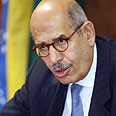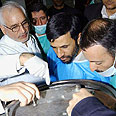
Mohamed ElBaradei
Photo: AP

Ahmadinejad at Natanz nuclear facility
Photo: AFP
The UN nuclear watchdog chief said on Monday Iran seemed to be holding back information needed to clarify intelligence reports that it researched nuclear bombs in secret and he demanded "full disclosure" by Tehran.
More Threats
Criminal and terrorist Zionist regime has reached the end of its work, Iranian president tells foreign guests marking 19th anniversary of death of country's late revolutionary leader. 'Satanic power' of United States faces destruction, he adds
In an unusually tough speech opening a meeting of the International Atomic Energy Agency's 35-nation Board of Governors, IAEA Director Mohamed ElBaradei said the intelligence remained a "matter of serious concern".
The Islamic Republic says the material, which was supplied by around 10 countries, primarily the United States, is forged but has not backed up its denials with evidence.
"Iran has not yet agreed to implement all the transparency measures required to clarify this cluster of allegations and questions," ElBaradei told the closed Vienna gathering.
"Iran has not provided the agency with all the access to documents and to individuals requested ... Nor provided the substantive explanations required to support its statements.
"The agency understands that Iran may have additional information, in particular on high explosives testing and missile-related activities, which should shed more light on the nature of the alleged activities," ElBaradei said. He said reaching conclusions about the nature of Iran's nuclear energy quest depended on Tehran demonstrating "full disclosure" regarding the intelligence material.
It is contained in 18 classified documents that were briefly summarized at the end of the IAEA's latest report on Iran issued on May 26, an extraordinary step reflecting the gravity with which the UN watchdog views the information.
'Information received only in electronic form'
The documentation points to links in Iran between uranium processing, explosives testing and attempts to modify a missile cone in a way that would be suitable for a nuclear warhead.
ElBaradei, however, said the investigation had also been hampered by the IAEA's inability to provide copies of the intelligence documents to Iran for perusal. The reason, diplomats say, is US concern about exposing its sources.
"The agency received much of the information ... Only in electronic form and was unfortunately not authorized to provide copies to Iran," the IAEA director said.
"Release of documents that are not sensitive from the proliferation perspective, including those purportedly showing interconnections between the three categories of alleged studies, would clearly help the agency in its investigations."
Iran has dismissed the information as fabricated or related solely to conventional military activity.
A senior Western diplomat in the meeting called ElBaradei's address unusually sharp, underlining growing IAEA exasperation with the Islamic Republic's behavior.
Iran has branded the concerted IAEA inquiry into alleged bomb studies as a creature of pressure by a few Western powers led by Washington, and warned on Sunday it might have to limit cooperation with the UN watchdog as a result.
Iran has denied a covert agenda to build atom bombs in violation of nuclear Non-Proliferation Treaty commitments.
It is accelerating uranium enrichment that it says will be for electricity generation only, but is under UN Sanctions for hiding the work in the past, continuing to curb IAEA inspections and refusing to halt enrichment in exchange for trade benefits.
ElBaradei said Iran could not get a clean bill of health without permitting snap inspections beyond its declared nuclear facilities. Iran rules this out unless the UN Security Council ends sanctions and returns control of its file to the IAEA.















